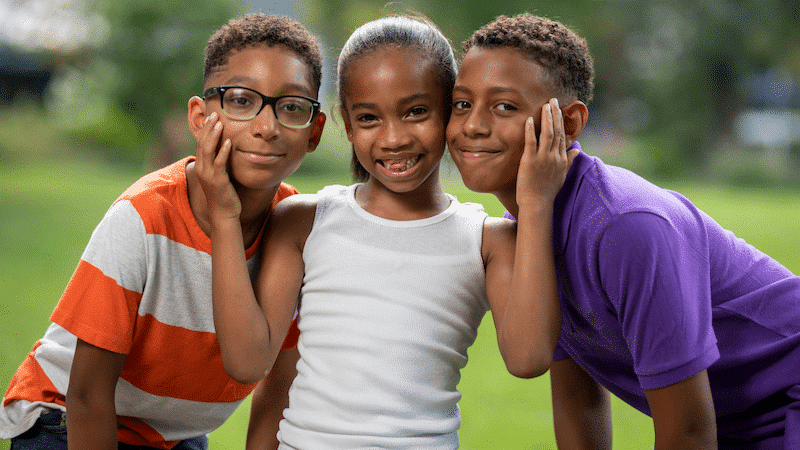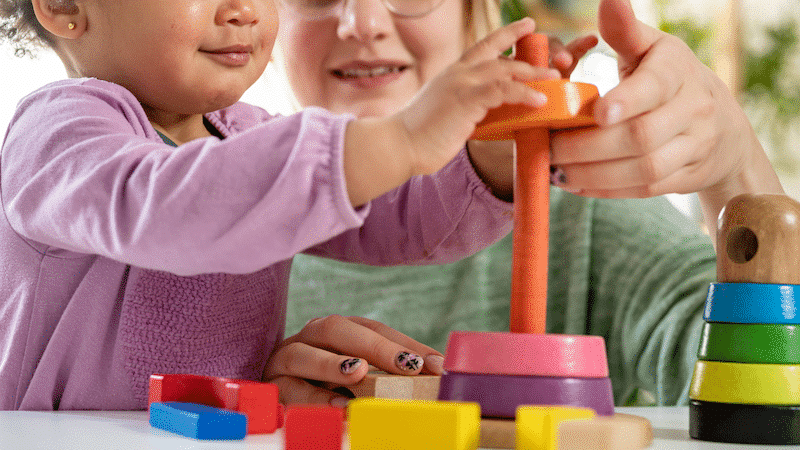What is Adultification?

Adultification originated as a term to describe when children are treated as older than they are, or when they are forced to grow up before their time. Now, it often specifically refers to the racist act of treating and perceiving minority children as older than they are, or expecting a level of maturity from them that is not expected of white children. Adultification is not when adults respect children and view them as mature and competent. Rather, adultification refers to the negative social and mental health outcomes associated with expecting a child to behave as an adult, such as, punishing a child for acting like a child, placing unwarranted responsibilities on them, or even sexualizing them. Black girls are disproportionately subjected to adultification when compared to their peers.
Where does the bias come from?
The adultification bias against minority children is inextricably linked to other racial prejudices and remnants of racial trauma.
Slavery
Adultification bias has its roots in slavery. Age was only a factor for slave owners when considering how much the child was physically capable of doing, and there was little distinction between adults and children. As a result, they were seen as undeserving of play and received punishment for behaving in child-like ways. During slave trade, black children were often separated from their families, meaning that they were put in a position where they did have to grow up fast in order to navigate through life.1
Innocence
While children are often presumed to be innocent, minority children are often not treated as such. A racist bias towards minority groups is the belief that they present higher risks to others’ safety or are more prone to criminal activities, a misconception that also extends to children. This racist stereotype has ties to slavery. In order to justify slave labor, black people were portrayed as aggressors, uncivilized, and animalistic.
One study revealed that when primary and secondary school black girls externalized their emotions, they were perceived as being threatening.2 The assumption that minority children are more malicious than white children influences how the adults around them respond to their emotional distress and what the outcome is, such as harsher punishments or even escalating to physical altercations. As a result, minority children are often encouraged by their parents to behave more maturely in order to avoid being stereotyped.
Hypersexualization
To hypersexualize is to portray something in an overly sexual way, particularly when one makes something sexual when it is not. Research shows that white people tend to focus on the sexual body parts of black women more than those of white women, thus, they face more objectification.3 The hypersexualization of black people can also be tied back to slavery. Slave owners portrayed black people as though they had a stronger desire for sex than white people as a way to justify sexually assaulting enslaved black women.
Considering that black people are disproportionately hypersexualized, black girls begin to be treated this way from a young age. They are assumed to start having sex earlier on in their lives than their white peers.3
Expected Strength
Strength, overcoming adversity, and resilience are all important values in many minority groups. Many minorities feel the need to always “be strong” in order to navigate a racist society, making it so that expressions of emotions are seen as a threat towards the ability to overcome adversity. Parents may invalidate their child’s emotions or teach them to keep their feelings inside because they fear what might happen if their child isn’t “strong enough” due to generational and racial trauma. Expecting a child to manage their emotions as an adult does can cause them to internalize their feelings and makes it harder to get help when they need it.
Socialized Adultification
Socialized adultification differs from prejudice-based adultification. It refers to when a child is put in a position where they take on adult-like roles or responsibilities in order to meet the needs of their family. However, this type of adultification still disproportionately impacts minority children. This can often happen in low-income families who cannot afford daycare or other resources that would take these burdens away from their children. As a result, not only are the children perceived to be more mature than their age, but they feel older as well because of their responsibilities.3
What Is The Impact?
Higher Standards Leads to Low Self-Esteem
Adultification holds children to the standards of an adult. When a child is held to a higher standard than should be reasonably expected from them, their self-esteem may suffer as a result, as they aren’t able to meet these expectations.
Harsher Punishments
Research shows that black girls and boys face harsher punishments for the same minor school infractions, such as using their cell phones when they are not permitted to, when compared to their white peers.4 Black girls are 2.7 times more likely to be referred to juvenile justice than white girls.5 These harsh punishments can shape a child’s sense of self and how they develop, potentially resulting in negative developmental outcomes. Black boys are criminalized from a young age, which can put them in the system before they’ve gotten a chance to fully develop.
Exposure to Precarious Knowledge
When treated as an adult, children may be exposed to knowledge typically associated with older people. They may not have the tools to properly process this information.
Peerification
Adults around them treat them as though they are one of them. When they see adults as their peers, someone who intends to groom them can more easily integrate themselves into their life without suspicion. They also may be exposed to drugs or alcohol at a young age.
Parentification
Children are parentified when given responsibilities that are not age-appropriate. They may be put into a position where they have to provide their siblings with emotional support and help them meet their basic needs. Parents may believe that because they took care of their siblings, that there is nothing wrong in making their children do the same, perpetuating a cycle of abuse.
Lack of Support
Research shows that as a result of adultification, black girls are seen as more independent and in less need of comfort and support3. Black girls may ultimately try to conform to these perceptions and struggle to get their needs met, which makes it hard for them to reach out when they do need support.
Internalizing Emotions
When children are raised to believe that outward displays of emotion are bad, they keep their emotions to themselves. Not only does it make it hard for them to get help when they need it, but it also can cause their mental health to suffer even more. Internalized emotions can lead to substance misuse, which can have dire physical consequences.
Loss of Childhood
When children are treated as an adult, the adults in their lives do not value the importance of play and wonder that define childhood. They may make the child feel as though their interests or desire to play are immature, despite being age-appropriate.
Children deserve to be children. Childhood is a very delicate period in one’s life where they are developing their sense of self and of the world around them. The messages children receive and the ways in which they are treated can have life-long impacts. It’s important to recognize that these biases exist, consciously or unconsciously, so that they can be corrected.
Sources:
- Martinez, N. (2023, March 7). What you should know about adultification bias. America’s Black Holocaust Museum. https://www.abhmuseum.org/what-you-should-know-about-adultification-bias/
- Cooper, A. (2023). The Impact of Adultification Bias on the Mental Healthcare Provided to Black Girls in U.S. Schools: A Novel Qualitative Analysis.
- Blake, J, & Epstein, R. (2019). Listening to Black Women and Girls: Lived Experiences of Adultification Bias. Georgetown Law Center on Poverty & Inequality.
- Morris, E. W., & Perry, B. L. (2017). Girls Behaving Badly? Race, Gender, and Subjective Evaluation in the Discipline of African American Girls. Sociology of Education, 90(2), 127-148. https://doi.org/10.1177/0038040717694876
- Puzzanchera, C, & Hockenberry, S. (2014) National Disproportionate Minority Contact Databook. Office of Juvenile Justice & Delinquency Prevention, U.S. Department of Justice.
Support Is Available

Ujima
Ujima The National Center on Violence Against Women in the Black Community, addresses the pervasive issues of sexual assault, and domestic and community violence within the Black Community. We champion the empowerment and resilience of Black women and girls.

Black Emotional and Mental Health Collective
Our mission is to remove the barriers that Black people experience getting access to or staying connected with emotional health care and healing through education, training, advocacy, and the creative arts.

Black Mental Health Alliance
The Black Mental Health Alliance focuses on improving mental health services for Black individuals, families, and communities by providing resources, education, and support to address mental health disparities. They work to enhance access to culturally competent care and empower Black communities to take control of their mental well-being.



